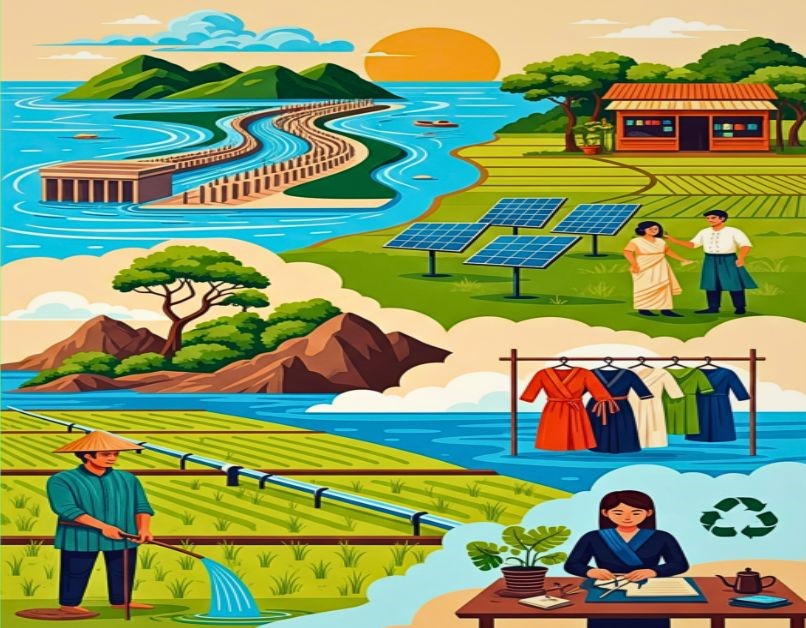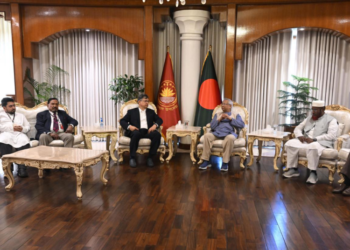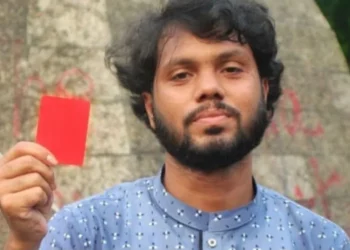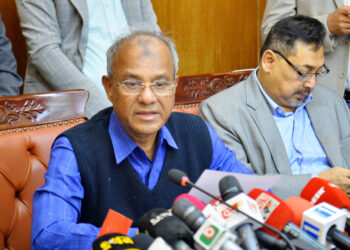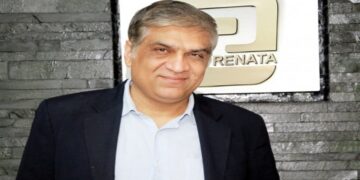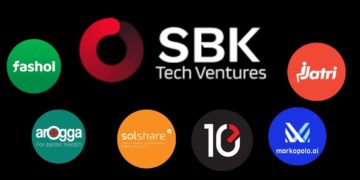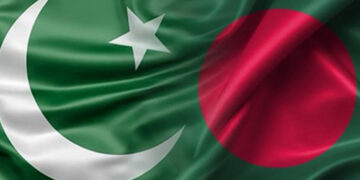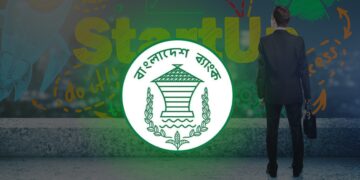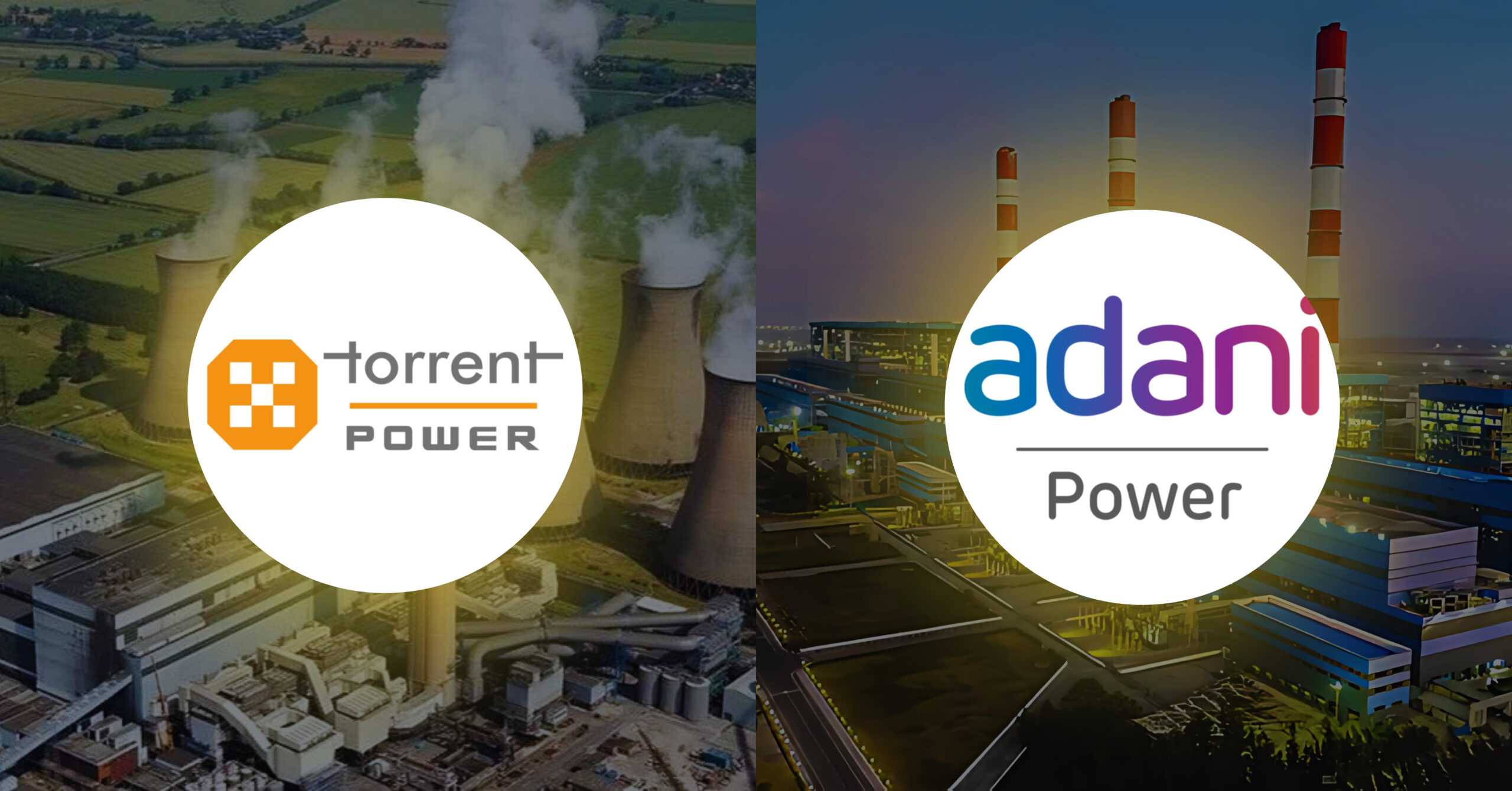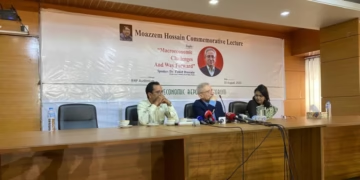MSME: The Backbone of Bangladesh’s Economy
In the alleys of Dhaka’s bustling neighborhoods, in the quiet corners of rural villages, and behind the counters of countless shops and workshops—(MSME) Micro, Medium and Small Enterprises form the invisible spine of Bangladesh’s economy.
Cottage, micro, small, and medium enterprises (CMSMEs) are the driving force of Bangladesh’s economy. They employ nearly 87% of the national workforce and contribute around 25% of GDP. As the country prepares for its graduation from Least Developed Country (LDC) status, empowering CMSMEs with resilience, competitiveness, and productivity is more urgent than ever.
On June 27, the world observed MSME Day- a moment to reflect on the roles these enterprises play globally. But in Bangladesh, the day took on a renewed urgency. As the country nears its graduation from the Least Developed Country (LDC) status, questions around sustainability, resilience, and inclusive growth are front and center. And CMSMEs, often the most vulnerable, are also poised to be the most transformative.
A Sector Facing Dual Pressures: Growth and Vulnerability
For many CMSME owners in Bangladesh, business is never just business. It’s survival. Climate change is no longer a distant threat, it’s a daily obstacle. Whether it’s flash floods washing away inventory or salinity damaging farmland used for cottage industries, climate risks are disproportionately hurting small enterprises that already operate with razor-thin margins.
The problem is layered:
-
Limited access to affordable finance
-
Disproportionate impact of climate shocks
-
Inadequate business continuity infrastructure
-
Exclusion of women and rural entrepreneurs from financial ecosystems
Yet, despite these challenges, the CMSME sector has shown extraordinary adaptability. What it now needs is a systemic push one that brings together climate finance, inclusive innovation, and institutional support.
A New Model that Blended Finance for Climate-Vulnerable CMSMEs
In this context, a national workshop held recently in Dhaka, jointly organized by the SME Foundation and UNDP Bangladesh, marks a turning point. The spotlight was on a proposed blended finance framework tailored specifically to address the needs of CMSMEs in climate-vulnerable regions.
Blended finance which strategically mixes public, private, and philanthropic capital is emerging as a powerful tool to close financing gaps. By lowering risks for private investors, it can unlock climate-related investments that would otherwise bypass smaller enterprises.
“UNDP and the SME Foundation are committed to ensuring that climate-vulnerable CMSMEs are not left behind. To truly scale impact, we must close the adaptation finance gap and ensure the cost of resilience never falls on those least able to bear it,”
said Sonali Dayaratne, Deputy Resident Representative of UNDP Bangladesh.
The overall message likely aims to highlight how climate-smart training helps individuals or communities especially in rural or climate-vulnerable areas—access digital markets, enabling them to:
-
Adapt to climate change by using sustainable techniques in agriculture, crafts, or production.
-
Build resilience through income diversification and economic empowerment.
-
Leverage e-commerce platforms to reach wider markets beyond local or regional limitations.
For example, farmers trained in climate-resilient agriculture might learn how to grow organic produce, then receive support to sell their goods through e-markets.
Similarly, artisans preserving traditional craftsmanship might be trained to use eco-friendly materials and market their products online via platforms like Etsy, Daraz, or Facebook Shops.
This connection creates a powerful feedback loop:
Climate-smart practices → higher-quality, sustainable goods → access to broader markets → increased income → greater resilience to climate shocks.
From Sustainable Skills to Digital Sales Communities Through Climate-Smart Training.
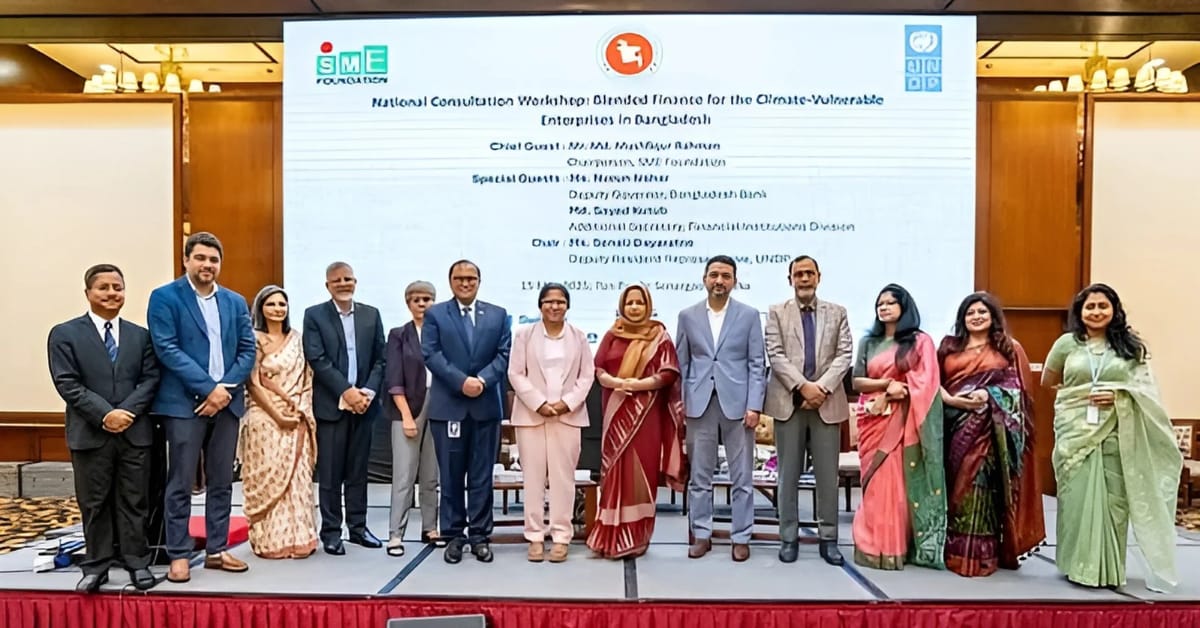
The event didn’t just include presentations; it brought real, urgent voices to the table:
-
Md Mushfiqur Rahman, Chairperson of SME Foundation, emphasized the need for fast, fair, and flexible climate finance, specially for first-time entrepreneurs.
-
Nurun Nahar, Deputy Governor of Bangladesh Bank, highlighted how the financial sector must internalize sustainability, stating that blended finance offers a pragmatic way to de-risk investments and support small businesses.
-
Sultana Yasmin, Joint Secretary at the Ministry of Industries, underscored how insights from this workshop will directly influence SME Policy 2025, with a sharp focus on climate resilience.
-
Sayed Kutub, from the Finance Ministry, said, “We need coordination, not just intent. This is a multi-stakeholder challenge that demands a unified response.”
The consensus was clear that Bangladesh must not only build back better but build forward greener.
Homegrown Strength: Women-Led Small Enterprises in Cooking, Baking and Climate Smart Skills
In kitchens across villages and towns, women are turning traditional skills into modern businesses. From baking cakes to preparing organic pickles, jam, snacks, or meals these small, home-based food enterprises are creating waves in local and online markets.
Read More: Guada-Negative: The Rarest Blood Group Discovered That Left Scientists Amazed
With the help of:
-
Climate-smart training (such as energy-efficient cooking, local ingredient use, and waste reduction),
-
Safe food handling and packaging skills,
-
Digital tools like Facebook Shops, WhatsApp orders, and food delivery apps,
women are now running eco-conscious food businesses that are profitable and sustainable.
These businesses:
-
Support families financially,
-
Empower women socially,
-
Preserve culinary heritage, and
-
Reduce environmental impact.
A woman with a recipe, a phone, and a purpose can feed her community and build a business.
Women at the Heart of Change
A particularly powerful aspect of the proposed model is its focus on women entrepreneurs, many of whom operate small or home-based enterprises.
Whether it’s weaving sarees in Sirajganj, cultivating mushrooms in Bandarban, or managing mobile money booths in urban slums, women-led CMSMEs are deeply vulnerable to climate stress and even more cut off from formal financing.
The framework seeks to change that through:
-
Gender-inclusive lending practices
-
Capacity building programs for women
-
Targeted insurance schemes for disaster resilience
-
Digital finance training to expand access
Innovation Meets Local Wisdom
One of the strengths of Bangladesh’s CMSME sector is that it is deeply rooted in local knowledge systems. From natural dyeing to sustainable jute production, many small businesses already practice eco-friendly methods that they just lack visibility and support.
The proposed framework recognizes this and calls for:
-
Community-based adaptation programs
-
Climate-smart financial products
-
Insurance coverage against climate disasters
-
Simplified regulations for green certification
Development partners such as the Embassy of Sweden, British High Commission Dhaka, The World Bank, and Green Delta Insurance PLC pledged to align their support with local realities and business models not just global benchmarks.
“Innovation doesn’t always mean high-tech. Sometimes, it’s about recognizing the value in what communities are already doing,”
said Farzanah Chowdhury, CEO of Green Delta Insurance PLC.
The workshop’s technical sessions explored how to operationalize the blended finance facility with the participation of banks, microfinance institutions, regulators, and insurers.
Participants agreed that no single actor can address the systemic vulnerability of CMSMEs alone. It will take:
-
Coordinated national policies
-
Private sector engagement
-
Development partner collaboration
-
Grassroots participation
As Md Nazeem Hassan Satter, Deputy Managing Director of SME Foundation, put it:
“This is not a one-off initiative. We are building an ecosystem. We are calling on all partners public and private to walk this road with us.”
With Bangladesh’s LDC graduation just around the corner, international trade preferences and concessional aid may begin to shrink. The nation must find internal resilience, and CMSMEs are a strategic starting point.
But resilience doesn’t happen in silos. It comes from safety nets, climate adaptation, capacity building, and fair finance. The blended finance model is a bridge toward that future. If implemented effectively, it could make Bangladesh a global leader in inclusive green enterprise transformation.
A Greener, Inclusive Tomorrow Starts with CMSMEs
CMSMEs in Bangladesh aren’t just part of the economy. They are the economy for millions. They are the tailor who sews school uniforms, the woman selling pickles online, the weaver using jute, the craftsman who trains his nephew.
If we want an economy that is resilient, inclusive, and climate-smart, we must invest in these very people. Not out of charity, but because they are the change-makers, the innovators, the resilient backbone of Bangladesh.
Let MSME Day be more than a symbolic celebration. Let it be a starting point for building an economy where no entrepreneur is left behind no matter how small their enterprise, or how big the climate threat.
References:
Prothom Alo
UNDP
Share via:

